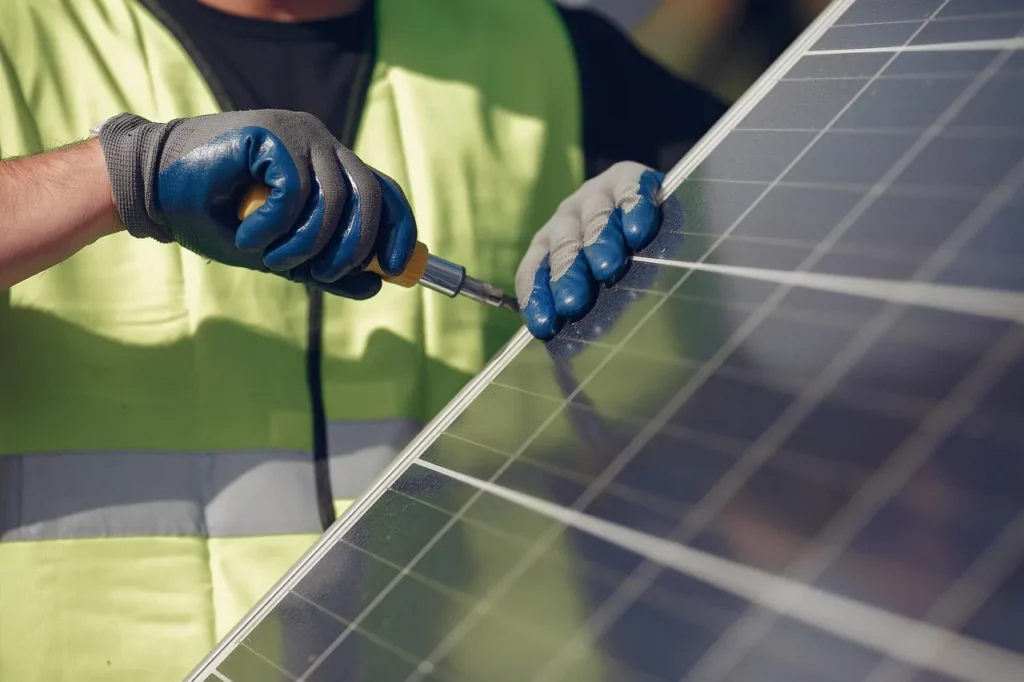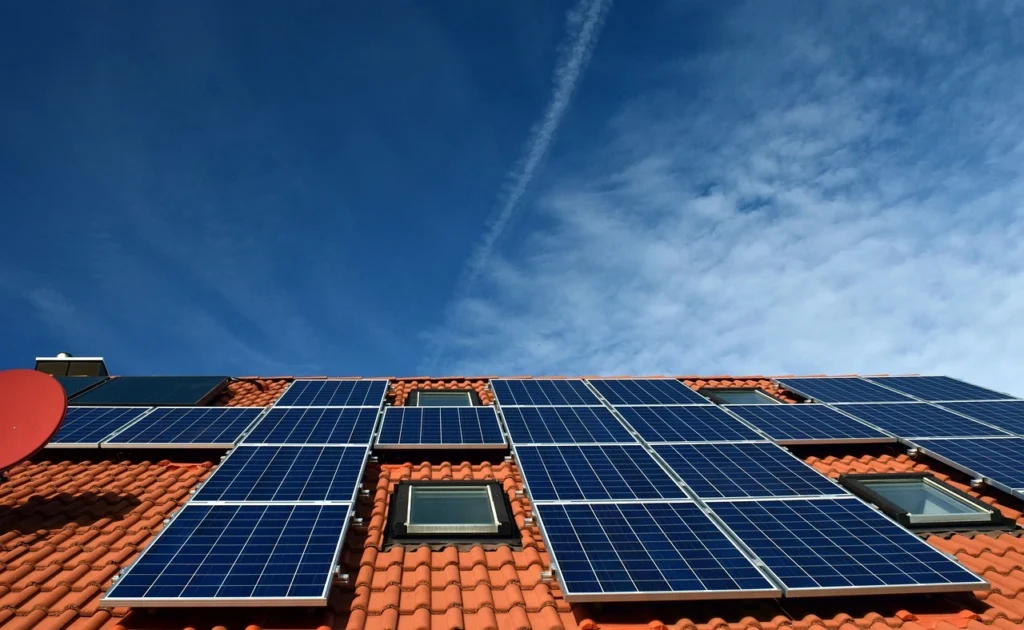Solar energy is increasingly becoming a key player in the UK’s shift towards renewable power. However, despite its rising popularity, various myths and misunderstandings continue to exist. These misconceptions can discourage homeowners from considering a clean and cost-effective method to power their homes. In this article, we will unveil seven common myths about solar panels and clarify the truth about solar energy.
Misconception 1: Solar panels don’t work on cloudy days
One of the most persistent myths, especially here in the UK, is that solar panels are useless without constant, bright sunshine. It’s easy to see why this belief exists, but the reality is quite different.
The Reality: Panels work in low light
Solar panels convert photons from daylight into electricity. While their output is highest on a bright, sunny day, they continue to generate power on overcast or rainy days. Think of it like this: your skin can still get sunburnt on a cloudy day because UV rays penetrate the clouds. In a similar way, solar panels capture the diffused light that gets through.
Consider Germany, a country not known for its sunny climate, which is one of the world’s leaders in solar energy adoption. This proves that high levels of sunshine are not a prerequisite for effective solar power generation. While a UK system will produce less on a dreary winter day than in the middle of July, it will still be contributing to your home’s energy needs year-round.

Misconception 2: Solar panels only work in a hot climate
It seems logical that hotter weather would mean more power from the sun. However, solar panel efficiency is not directly tied to temperature. In fact, extreme heat can hinder performance.
The Reality: Panels are more efficient in cooler temperatures
Solar panels are tested at a standard temperature of 25°C to measure their peak performance. Like most electronic devices, they can become less efficient when they get too hot. High temperatures increase the electrical resistance within the panel’s cells, slightly reducing their power output.
This means that a cool, bright day can actually be more productive for a solar panel system than a sweltering summer afternoon. The UK’s moderate climate, with its plentiful daylight hours and less extreme heat, provides an excellent environment for solar panels to operate at or near their optimal efficiency.
Misconception 3: Solar power is too expensive for most homeowners
The initial cost of installing a solar panel system is often seen as a major barrier. Many people believe it’s a luxury reserved for the wealthy, but the financial landscape of solar has changed dramatically.
The Reality: Costs have fallen and financial support is available
Over the past decade, the price of solar panels has plummeted, making them more accessible than ever before. This steep drop in manufacturing costs has been a game-changer for the residential solar market.
Furthermore, a variety of financial incentives and purchasing models can significantly reduce the upfront investment. Financing options allow homeowners to pay for their system over time, often with monthly payments that are lower than their previous energy bills. Government schemes and grants may also be available to offset the cost. When you factor in the long-term savings on your electricity bills, a solar panel system becomes a wise financial investment, not an unattainable expense.
Misconception 4: Solar panels will damage my roof
Homeowners are rightly protective of their property, and the idea of drilling into their roof can be unnerving. The fear that solar panels could cause leaks, structural damage, or void a roof’s warranty is a common concern.
The Reality: Proper installation protects your roof
When installed by certified and experienced professionals (such as the experts at Goodwill Electrical), a solar panel system is perfectly safe for your roof. Installers use specialised mounting equipment and sealants to ensure every connection point is waterproof and secure. A thorough structural assessment is conducted before any work begins to confirm that your roof can easily support the weight of the panels.
In many cases, solar panels can actually extend the life of your roof. By covering a large portion of it, they shield the underlying materials from the elements, such as rain, snow, and UV radiation. This protective layer reduces wear and tear, helping your roof last longer.
Misconception 5: Solar panels require constant maintenance
Another common worry is that a solar panel system is like a car, requiring regular and expensive maintenance to keep it running. People imagine themselves having to climb onto the roof for constant cleaning and repairs.
The Reality: Solar panels are durable and need minimal upkeep
Modern solar panels are built to be incredibly durable and largely self-sufficient. They have no moving parts, which dramatically reduces the chances of mechanical failure. Most systems are designed to last 25 to 30 years or more with very little intervention.
For the most part, rainfall is sufficient to wash away the dust and debris that can accumulate on the panels. An annual inspection and a professional clean every few years may be recommended to ensure optimal performance, but this is a far cry from “constant maintenance.” Your installer will provide you with a simple maintenance schedule, but you can mostly sit back and enjoy the energy savings.
Misconception 6: You’ll be “off-grid” automatically
The dream of total energy independence is appealing, leading many to believe that installing solar panels means cutting ties with the utility company completely.
The Reality: Most systems are grid-tied for reliability
The vast majority of residential solar installations are “grid-tied.” This means your home remains connected to the national electricity grid. During the day, you use the power from your panels, and any excess energy you generate can be sold back to the grid. At night, or on very low-light days when your panels aren’t producing enough power, you seamlessly draw electricity from the grid as usual.
This grid connection provides reliability and ensures you always have power when you need it. True “off-grid” systems are possible, but they are more complex and require a large battery bank to store energy for when the sun isn’t shining. While adding a battery to a grid-tied system is a great way to store your excess solar power for use at night and provide backup during a power cut, it is typically an optional add-on rather than a standard feature.

Misconception 7: Solar panels don’t increase home value
Some homeowners fear that a solar panel system might be seen as an unattractive or complicated feature that could deter potential buyers when it comes time to sell.
The Reality: Homes with solar sell faster and for more
Multiple studies have shown the opposite to be true. A home equipped with solar panels is a highly attractive asset on the property market. Today’s buyers are savvy about energy costs and sustainability, and they see the clear value in a home that comes with significantly lower electricity bills.
Research indicates that homes with solar panels not only sell for a premium but also spend less time on the market. The long-term savings and the appeal of green energy are powerful selling points. Investing in solar is not just an investment in your energy future, but an investment in your property’s value.
Looking to Install Solar Panels on Your Home?
Leave it to the professionals at Goodwill Electrical. Our experienced team specialises in the installation of high-quality solar panels for your home, enabling you to significantly reduce your electricity costs and contribute to a more sustainable environment. By harnessing the power of solar energy, you can enjoy long-term savings on your utility bills while also increasing the value of your property.
To start experiencing the numerous benefits of solar energy, contact us today for a free, no-obligation quote.


















